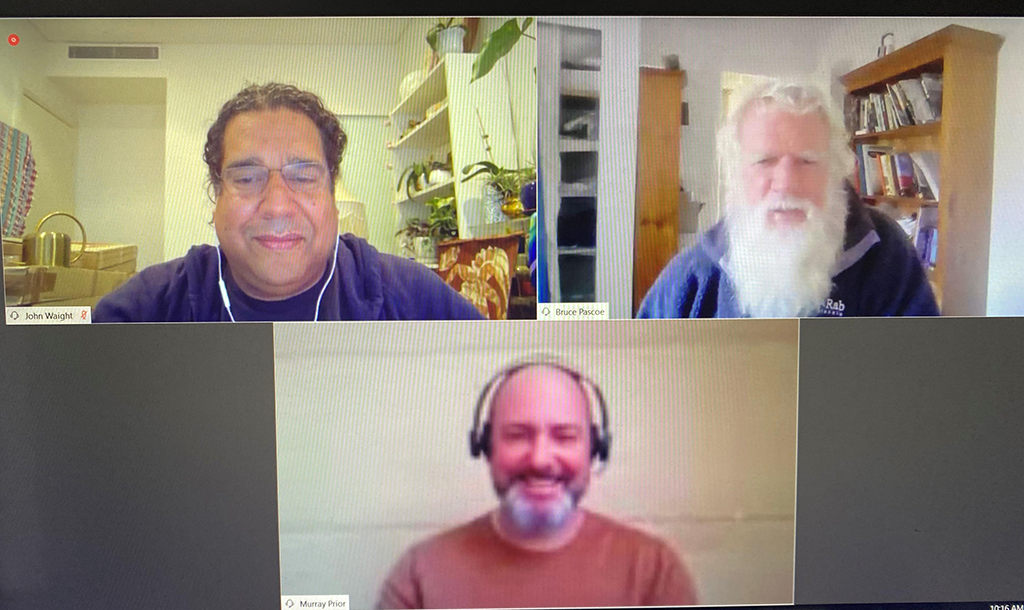Reconciliation Week 2020

Reconciliation aspires to a fair and equal Australia. It requires the nation to pause, to think and to come together with Aboriginal and Torres Strait Islander peoples. With that end in mind, reconciliation is a national – at times painful – transitioning process, the goal of which is to rectify the iniquity, remedy the injustice and remove the obstacles that Indigenous Australians face in social, political and economic life.
Artists in the Black, and Arts Law, are committed to reconciliation. Our Reconciliation Action Plan emphasises the importance of education, law reform and the provision of legal services to bringing about positive change for Indigenous artists and communities. Our Outreach program continues to provide education sessions and will drafting clinics for all Indigenous communities, and we are working closely with our partners to provide legal information and documents in First Languages to provide greater access to justice.
We continue to promote respect for Indigenous Cultural and Intellectual Property, to arm Indigenous artists with the knowledge and tools they need to make a living in the arts, and to repudiate fake and unethical Indigenous art and culture. Our purpose statement – strengthening value and respect for arts and culture to make a better world – furthers our commitment to provide our Indigenous clients and partners with the tools they need to do business, to protect rights, and to preserve and advance culture, traditions and stories.
In addition to Reconciliation Week (25 May to 3 June), Arts Law wishes to observe and promote the following events in 2020 that also provide these opportunities for reflection on reconciliation: National Sorry Day (27 May); the anniversary of the 1967 Referendum (3 June); the Bawunga Festival (5-7 June); Mabo Day (10 June); NAIDOC Week (5-12 July) and National Aboriginal and Torres Strait Islander Children’s Day (4 August). Our acknowledgement of these days on the calendar is more than a token observance, but a call to action, that on these days we will pause, reflect and remember the goal of a reconciled Australia.
This morning Arts Law co-hosted a special event with our partners at King & Wood Mallesons, Celebrating Indigenous Authors featuring Bruce Pascoe & John Waight in conversation with KWM’s Murray Prior. Uncle Bruce Pascoe shared insights into why he was driven to write about Aboriginal histories and the importance of traditional knowledge in a modern Australia. We’d like to thank Uncle Bruce along with Murray Prior, Jane Timbs, Rebecca Stanley from KWM and a special thank you to Dan Creasy, KWM, for his ongoing support of Artists in the Black.
The value of reconciliation lies in what it means to individuals. Below are the reflections from our team for what reconciliation means to us. We encourage you to join us by reflecting with your friends, colleagues and family on what reconciliation means to you, and how together we can put our words into action:
It is time for non-Indigenous Australia to recognise how much we have to gain from listening to and learning from Aboriginal and Torres Strait Islander peoples. As we know so well at Arts Law, we are all enriched through Aboriginal and Torres Strait Islander arts and culture and it is part of our national identity.
Continually pursuing opportunities to gain a greater understanding of the history, culture and challenges of Aboriginal and Torres Strait Islander people and proactively sharing this knowledge with my networks to help build stronger appreciation and respect amongst our society.
To “reconcile” means more than just bringing people back together. The word “consilium” means a plan or a policy. Reconciliation is about conversations and education – but it’s also about planning to bring about a better future with equal opportunities for all Australians.
Reconciliation for me is about actively listening, prioritising and hearing from different voices and working to understand ideas that are new to me.
Reconciliation also means that us whitefellas need to ‘reconcile’ the invasion and the trauma it’s caused in our own collective unconscious. So first we need to admit it happened (which we haven’t done in a broad political sense) and examine with very clear eyes the history and the genocide and all the other Terrible Things.

